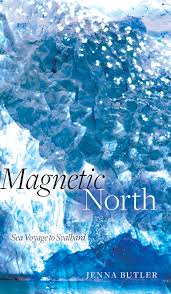Magnetic North: Sea Voyage to Svalbard is a finely drawn follow-up to Jenna Butler’s critically acclaimed poetry books, ecocriticism, and award-winning ecological writing about farming off the grid. With a poet’s ear and the observant attention of an environmental steward, Magnetic North is an intimate, breathtaking trek from the boreal forest to the Arctic Ocean—and back again. Human survival and impact are cast against sublime landscapes in this meditative, timely travelogue.

The introduction consists of “The Journey”—the premise of the book explained as Butler’s experience as a writer in residence on an ice-class schooner. These poems and photographs emerged over weeks spent sailing around the coasts and islands of Svalbard, a Norwegian archipelago in the high Arctic. Spanning the summer solstice, a group of artists took in the northern sun as it illuminated environmental deterioration caused by climate change.
“To watch a glacier calve is to watch time run in both directions at once.” Magnetic North gives witness to destruction in the form of ice “cracking its spine along the strait.” Insight is surreal and fraught, reading about walks flanked by polar bear guards, “boots filling with water that has not been water for eight thousand years.”
The book’s backbone is a series of titled sections, introduced by an epigraph and composed of a number of prose entries that combine travel diary with reflective, lyrical field notes. Past “Pyramiden,” an abandoned Russian coal mine “weeping its coal ichor into the sea,” through raucous “Ornithomancy,” we sail into “Night,” with “no twilight, no dusk, no dawn…so much sun that entrails, clapped blue against the rock, morph in an instant to chickweed.”
“Darkness has become our last wilderness,” a Sid Marty epigraph warns, and Butler examines what that can mean in a world of bleached bones and snow blindness. The bright sky offers no respite from the heart-rending sight of melting ice caps, and the ship’s passengers learn “what the explorers knew: that darkness is not a right but an indulgence.” Psyche layers into poetry, confronting geophysical deterioration with a precise sense of consequence: “The wilderness is in the darkness and the darkness is internal…All the world in your eyes staring back.”
Amid unfathomable expanse, the vessel is pressurized. A group of strangers in close, daunting quarters has “no space on this ship to take anything personally.” For a body accustomed to prairie, there is “scarcely enough room for me to circle inside my own skin,” yet personal disclosure becomes part of the investigation. “There is nowhere to hide…split open to this place at the top of the world.” The writer delves deeper, weaving her own embodied currents with deft descriptions of the people inhabiting these remotest of places. “Where are the women in all this?” Questions resonate amid scrap metal and mines. Perhaps waiting on a mainland, in “an altered interior country, even if the men come home again.” Somehow desolation remains rife with vital movement.
The section “Leaving Days” gives way to “Song to the Boreal,” a closing hymn. At home, the danger is crude oil and forest fire—connected threats of heat. Immersed in familiar botany, we are left with a beautiful, ongoing reckoning as “Summer opens its palm.”
Butler’s tuned-in engagement with nature appears set to continue in her forthcoming essay collection Revery: A Year of Bees, out from Wolsak and Wynn in fall 2020.
Bios
Jordan Prato
Born in Toronto and raised in the sticks of Tweed, Ontario, Jordan Prato is a Carleton University Alumni and school teacher. [updated November 2023]

